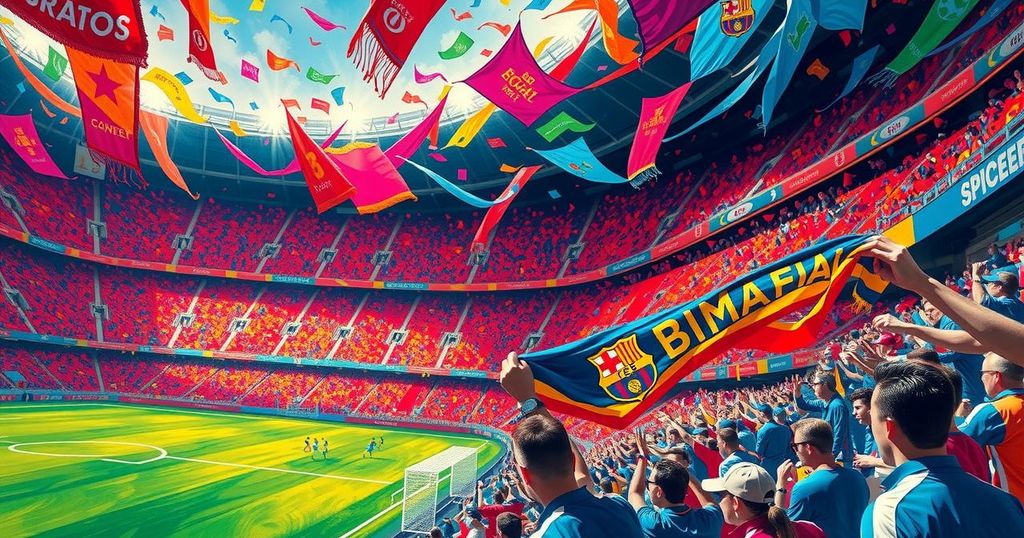PSG Fans Highlight Rwanda’s Controversial Sponsorship Amid DRC Crisis

Events in the DRC have drawn attention to sponsorship deals between the Rwanda Development Board and top football clubs like PSG, Bayern Munich, and Arsenal. As controversies surrounding Rwandan troop involvement in the M23 group surface, advocates call for these clubs to sever ties with RDB, emphasizing ethical responsibilities. The debate highlights the implications of sports sponsorship in global politics and humanitarian issues.
Recent events in the eastern Democratic Republic of Congo (DRC) have raised significant concerns regarding the sponsorship agreements between the Rwanda Development Board (RDB) and major football clubs such as Paris Saint-Germain (PSG), Bayern Munich, and Arsenal. These clubs have advanced to the quarter-finals of the Champions League, showcasing the RDB’s “Visit Rwanda” logo prominently.
PSG eliminated Liverpool during a penalty shoot-out, while Bayern Munich achieved a decisive 5-0 victory over Bayer Leverkusen, and Arsenal secured a notable 9-3 win against PSV Eindhoven. As these teams prepare for their upcoming matches, their connections with the RDB face increasing scrutiny due to allegations of Rwandan military support for the M23 rebel group amid the ongoing conflict in the DRC.
Despite Kigali’s insistence that it is acting defensively against hostile forces, human rights organizations and the United Nations have provided evidence of Rwanda’s support for M23. Calls for transparency and accountability have intensified, with advocates urging football clubs to reconsider their partnerships with RDB. Jordan Madiande, who initiated a petition urging PSG to terminate its contract with RDB, asserted the ethical responsibilities of such internationally recognized clubs.
The sponsorship ties have drawn criticism as Arsenal’s partnership with “Visit Rwanda” dates back to May 2018, while PSG’s agreement was signed in 2019 and renewed in May 2023. The RDB’s logo is prominently showcased on apparel and promotional materials related to PSG’s operations. Madiande emphasizes that PSG must uphold the values of respect and humanitarian awareness by cutting ties with RDB.
The petition supporting the campaign has garnered significant backing, amassing 73,000 signatures. In correspondence with PSG and other clubs, DRC Foreign Affairs Minister Thérèse Kayikwamba Wagner criticized the sponsorships during a time of humanitarian crisis, calling for a review of these contracts. Despite the ongoing conflict claiming thousands of lives and displacing many, clubs like Arsenal and Bayern Munich have maintained their affiliations with RDB.
The stipulations of the contract under scrutiny highlight Rwanda’s increasing influence in the sports domain, as the nation vies for international sporting events like the 2027 Formula 1 Grand Prix. Critics argue that such endeavors are strategically employed to distract attention from internal governance issues and human rights violations.
Michela Wrong, an author specializing in Rwandan and DRC affairs, contends that President Kagame effectively utilizes sports as a means of “sportswashing,” and that these initiatives are cleverly marketed to an audience less aware of the complex political context. In response to criticism, RDB has claimed that their partnerships contribute significantly to Africa’s socioeconomic progress despite accusations of misinformation from DRC authorities.
As PSG prepares to face Marseille in an important Ligue 1 clash, Madiande remains hopeful that the club will reevaluate its sponsorship. He expressed a deep commitment to the club but stated that if the situation persists, supporters would need to take more visible action against the sponsorships.
The critical nature of this issue has prompted intense dialogue surrounding the intersection of sports, politics, and human rights, raising questions about the responsibilities of football clubs as global entities engaged in significant sponsorship arrangements.
In conclusion, the ongoing scrutiny of sponsorship agreements between football clubs and the Rwanda Development Board underscores broader geopolitical and humanitarian concerns stemming from the DRC conflict. With mounting pressure from advocates like Jordan Madiande, a clear ethical dimension is introduced regarding the responsibilities of international teams like PSG, Arsenal, and Bayern Munich. As these clubs continue to play pivotal roles in promoting their sponsors, their decisions may shape public perception and influence future discussions on the complex relations between sport and political accountability.
Original Source: www.rfi.fr








